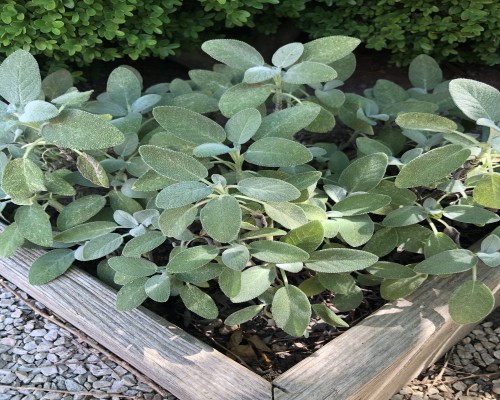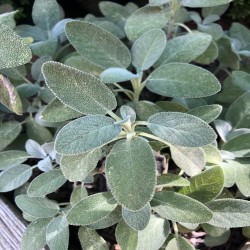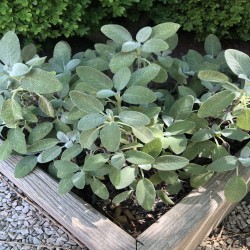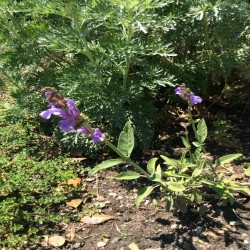SAGE
“Our ordinary garden Sage needs no description.
[Time] It flowers in or about July.
[Government and virtues] Jupiter claims this, and bids me tell you, it is good for the liver, and to breed blood. A decoction of the leaves and branches of Sage made and drank, saith Dioscorides, provokes urine, brings down women’s courses, helps to expel the dead child, and causes the hair to become black. It stays the bleeding of wounds, and cleanses foul ulcers. Three spoonfuls of the juice of Sage taken fasting, with a little honey, doth presently stay the spitting or casting of blood of them that are in a consumption. These pills are much commended; Take of spikenard, ginger, of each two drams; of the seed of Sage toasted at the fire, eight drams; of long pepper, twelve drams; all these being brought into powder, put thereto so much juice of Sage as may make them into a mass of pills, taking a dram of them every morning fasting, and so likewise at night, drinking a little pure water after them. Matthiolus saith, it is very profitable for all manner of pains in the head coming of cold and rheumatic humours: as also for all pains of the joints, whether inwardly or outwardly, and therefore helps the falling-sickness, the lethargy, such as are dull and heavy of spirit, the palsy; and is of much use in all defluctions of rheum from the head, and for the diseases of the chest or breast. The leaves of Sage and nettles bruised together, and laid upon the imposthume that rises behind the ears, doth assuage it much. The juice of Sage taken in warm water, helps a hoarseness and a cough. The leaves sodden in wine, and laid upon the place affected with the palsy, helps much, if the decoction be drank; Also Sage taken with wormwood is good for the bloody-flux. Pliny saith, it procures women’s courses, and stays them coming down too fast: helps the stinging and biting of serpents, and kills the worms that breed in the ear, and in sores. Sage is of excellent use to help the memory, warming and quickening the senses; and the conserve made of the flowers is used to the same purpose, and also for all the former recited diseases. The juice of Sage drank with vinegar, hath been of good use in time of the plague at all times. Gargles likewise are made with Sage, rosemary, honey-suckles, and plantain, boiled in wine or water, with some honey or allum put thereto, to wash sore mouths and throats, cankers, or the secret parts of man or woman, as need requires. And with other hot and comfortable herbs, Sage is boiled to bathe the body and the legs in the Summer time, especially to warm cold joints, or sinews, troubled with the palsy and cramp, and to comfort and strengthen the parts. It is much commended against the stitch, or pains in the side coming of wind, if the place be fomented warm with the decoction thereof in wine, and the herb also after boiling be laid warm thereunto.”
Source: The Project Gutenberg EBook of The Complete Herbal, by Nicholas Culpeper, [162]



